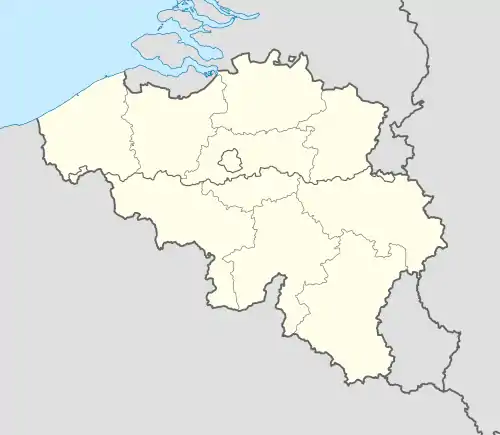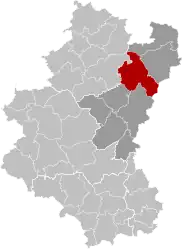Houffalize
| |
|---|---|
City and municipality | |
.jpg.webp) Houffalize | |
 Flag  Coat of arms | |
Location of Houffalize | |
 Houffalize Location in Belgium
Location of Houffalize in Luxembourg province  | |
| Coordinates: 50°08′N 05°47′E / 50.133°N 5.783°E | |
| Country | |
| Community | French Community |
| Region | Wallonia |
| Province | Luxembourg |
| Arrondissement | Bastogne |
| Government | |
| • Mayor | Marc Caprasse (cdH, G&S) |
| • Governing party/ies | Gestion & Service (G&S) |
| Area | |
| • Total | 167.41 km2 (64.64 sq mi) |
| Population (2021-12-01)[1] | |
| • Total | 5,244 |
| • Density | 31/km2 (81/sq mi) |
| Postal codes | 6660, 6661, 6662, 6663, 6666 |
| NIS code | 82014 |
| Area codes | 061 |
| Website | houffalize.be |
Houffalize (French pronunciation: [ufaliz] ⓘ; German: Hohenfels; Walloon: Oufalijhe) is a city and municipality of Wallonia located in the province of Luxembourg, Belgium.[2]
On 1 January 2007 the municipality, which covers 166.58 square kilometres (64.32 sq mi), had 4,802 inhabitants, giving a population density of 28.8 inhabitants per km².
The municipality consists of the following districts: Houffalize, Mabompré, Mont, Nadrin, Tailles, Tavigny, and Wibrin. Other population centers include Achouffe, Alboumont, Bœur, Bonnerue, Buret, Cetturu, Chabrehez, Cowan, Dinez, Engreux, Filly, Fontenaille, Mormont, Ollomont, Pisserotte, Sommerain, Taverneux, Vellereux, Vissoûle, Wandebourcy, and Wilogne.
History
Houffalize was a strategic location during the Battle of the Bulge of World War II. Specifically, Generals Montgomery and Patton met up here, Montgomery coming from the north and Patton from the south, in their counter-attack against the German forces remaining in the area. The town was flattened on the night of 5–6 January 1945 by ninety RAF Lancasters of Bomber Command to block the key crossroads for German supply columns and the escape route for German forces. Patton wrote a poem in his diary about the bombing.
International relations
Twin towns - Sister cities
Houffalize is a founding member of the Douzelage, a unique town twinning association of 24 towns across the European Union. This active town twinning began in 1991 and there are regular events, such as a produce market from each of the other countries and festivals.[3][4] Discussions regarding membership are also in hand with three further towns (Agros in Cyprus, Škofja Loka in Slovenia, and Tryavna in Bulgaria).
 Altea, Spain - 1991
Altea, Spain - 1991 Bad Kötzting, Germany - 1991
Bad Kötzting, Germany - 1991 Bellagio, Italy - 1991
Bellagio, Italy - 1991 Bundoran, Ireland - 1991
Bundoran, Ireland - 1991 Granville, France - 1991
Granville, France - 1991 Holstebro, Denmark - 1991
Holstebro, Denmark - 1991.svg.png.webp) Schaerbeek, Belgium - 1991
Schaerbeek, Belgium - 1991 Meerssen, the Netherlands - 1991
Meerssen, the Netherlands - 1991 Niederanven, Luxembourg - 1991
Niederanven, Luxembourg - 1991 Preveza, Greece - 1991
Preveza, Greece - 1991 Sesimbra, Portugal - 1991
Sesimbra, Portugal - 1991 Sherborne, United Kingdom - 1991
Sherborne, United Kingdom - 1991 Karkkila, Finland - 1997
Karkkila, Finland - 1997 Oxelösund, Sweden - 1998
Oxelösund, Sweden - 1998 Judenburg, Austria - 1999
Judenburg, Austria - 1999 Chojna, Poland - 2004
Chojna, Poland - 2004 Kőszeg, Hungary - 2004
Kőszeg, Hungary - 2004 Sigulda, Latvia - 2004
Sigulda, Latvia - 2004 Sušice, Czech Republic - 2004
Sušice, Czech Republic - 2004 Türi, Estonia - 2004
Türi, Estonia - 2004 Zvolen, Slovakia - 2007
Zvolen, Slovakia - 2007 Prienai, Lithuania - 2008
Prienai, Lithuania - 2008 Marsaskala, Malta - 2009
Marsaskala, Malta - 2009 Siret, Romania - 2010
Siret, Romania - 2010 Tryavna, Bulgaria - 2011
Tryavna, Bulgaria - 2011
See also
References
- ↑ Error: Unable to display the reference properly. See the documentation for details.
- ↑ Sven Vrielinck: De territoriale indeling van België 1795-1963 Volume 1. Universitaire Pers Leuven 2000. page 48.
- ↑ "Douzelage.org: Home". www.douzelage.org. Archived from the original on 2010-02-17. Retrieved 2009-10-21.
- ↑ "Douzelage.org: Member Towns". www.douzelage.org. Archived from the original on 2009-04-06. Retrieved 2009-10-21.
External links
- Official website (in French and Dutch)
